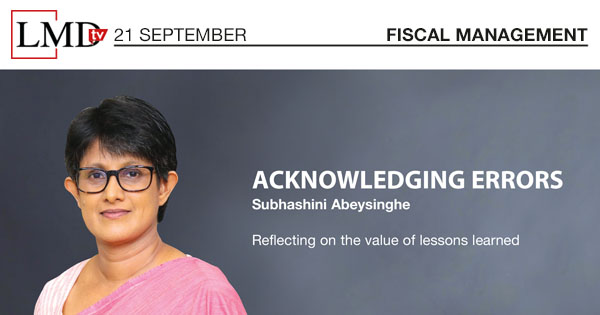Research Director at Verité Research Subhashini Abeysinghe, in conversation with LMDtv not long ago, identified two key flaws in the recently announced interim budget measures: a lack of attention to correcting past errors in export strategy and gaining entry to the global trade market.
The COVID-19 pandemic and its aftermath, combined with the current geopolitical climate around the world, “have reshaped or are reshaping the global trade landscape,” she said.
Abeysinghe continued: “One of the problems with Sri Lanka’s export strategy is the general failure to learn about and understand global trends, and respond proactively and positively to emerging opportunities – and about how to overcome and address challenges.”
The economist proceeded to say that “these policy statements lack action. We frequently find significant deviations from what a budget states it would do. Very rarely is there a government explanation for the reasons for deviation and what actions are planned to address the issue.”
“Little attention is paid to implementing these promises. Verité Research has been tracking budget implementation for about five years and one of the biggest challenges we encounter in tracking progress is the refusal of government agencies to disclose information,” Abeysinghe contended.
The researcher emphasised the importance of transparency and accountability – the people’s right to information and the government’s obligation to disclose such details.
“Unless we make substantial changes in how we monitor oversight and budget implementation, it’s challenging to think positively about the commitment and ability to implement,” she asserted.
Taking the Fiscal Management (Responsibility) Act as an example to highlight the outcomes of budgets implemented in the past, Abeysinghe said: “One of the aspects that the act envisages is that the government will keep a budget deficit of five percent of GDP… While the government’s budgeted deficit has always been within a bar of five percent, since 1977 to date Sri Lanka hasn’t achieved a five percent budget deficit.”
That this is just one of many pieces of evidence that suggests Sri Lanka has always “gone in the wrong direction,” that this is a luxury we can no longer afford and our past track record has not been great were among her observations.
“It’s difficult, cumbersome and time-consuming,” as Abeysinghe put it, to pay taxes. A simplified approach that’s easier to manage for taxpayers is needed to combat tax evasion, and strategic tax collection methods like withholding tax and PAYE tax would reduce tax evasion opportunities with no additional work on the part of taxpayers.
Abeysinghe also emphasised the importance of Sri Lanka Customs and said: “This organisation sits at the border, managing the logistics of exports and imports. It collects 50 percent of tax revenues and plays a vital role as a collector for the government.”
“I would like to bring everyone’s attention to the presidential commission of inquiry on Sri Lanka Customs,” she stated, highlighting that the report submitted to the president “includes recommendations on administrative and operational processes that Sri Lanka Customs could adopt, to effectively and efficiently deliver its services, and discharge its responsibilities.”
Despite President Ranil Wickremesinghe’s instruction that the report be referred to parliament (according to the press release issued by the presidential secretariat), this has not yet been done. She expressed concern over this lack of transparency and emphasised that “Sri Lanka needs to get its act together, and stick to fiscal targets and commitments.”
“Learn from mistakes of the past and do not repeat them; at least now, we should learn a lesson. And I hope the government realises that it has to change its ways,” Abeysinghe urged, concluding her interview on this edition of LMDtv.




